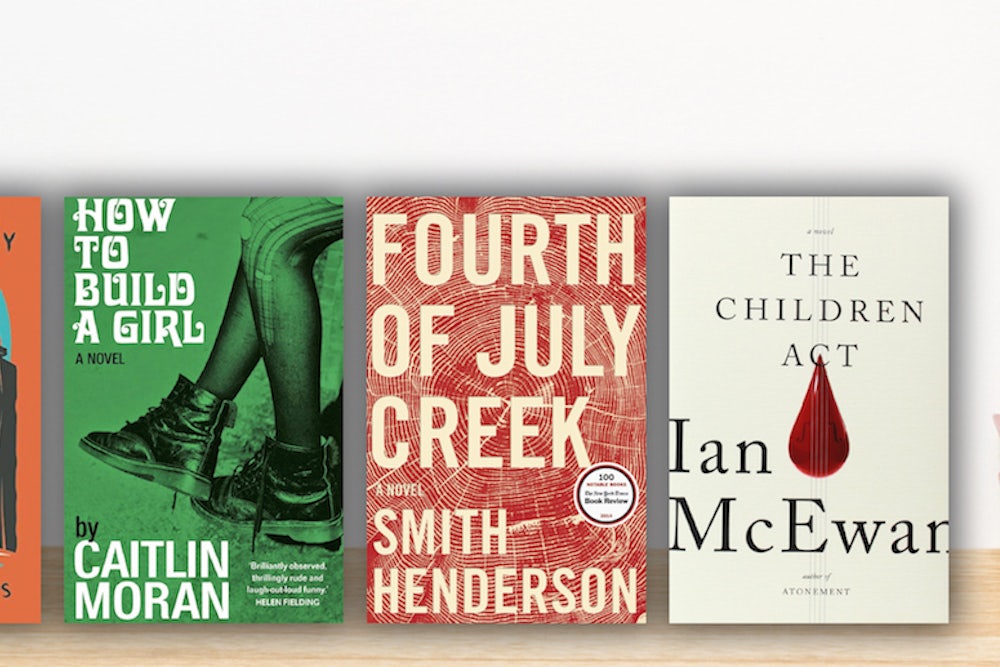Miriam Toews, All My Puny Sorrows

This book was an utter revelation. I found myself wondering, on nearly every page, how I could have remained ignorant of this brilliant writer for so many years. (Somewhere, my Canadian literary friends are shaking their heads in disdain.) I want to call her a Canadian Lorrie Moore, but the truth is that Toews is truly distinct, hilarious even when she’s dealing with the most heartbreaking and bleak of subjects—as she is here: The plot of this novel circles around one woman’s multiple attempts to kill herself, and her sister’s internal debate as to whether she should help her. Maybe bleak plot summaries like this one are what inadvertently kept me away from Toews in the past—why would anyone want to read that depressing story? But trust me, you must.
Smith Henderson, Fourth of July Creek

This book was my other major discovery of the year and my favorite debut. Henderson accomplishes that rare thing: combining experimental language and propulsive plot, so that you both marvel at the daring of his writing and eagerly flip the pages. It’s also a rare literary portrait of a class and segment of America that receives too little attention: abandoned children, over-extended social workers, and a whole host of other unappealing hardscrabble characters eking out an existence in the Montana semi-wilderness. (Along those same lines, I also liked Ron Rash’s portrait of Appalachia, Something Rich and Strange; Nicole Cullen’s short story “Long Tom Lookout” from Idaho Review; and Lauren Groff’s central Florida paen “At the Round Earth’s Imagined Corners." You can read those last two stories here.)
Ian McEwan, The Children Act

Sometimes I feel that we’ve become so accustomed to the elegance of McEwan’s writing that we fail to appropriately commend it. Oh yeah, another perfectly composed book by Ian McEwan. Maybe because of this, I don’t think this book quite got the attention it deserved. Here, McEwan continues his almost obsessive inquiry in to the mindset of a particular profession (in Saturday it was medicine, in this book, it is the law), pulling out the most torturous questions that those professions pose. This book focuses on the (inspired-by-real-life) case of a teenage Jehovah’s Witness who refuses life-saving medical care and the judge who must decide whether or not to force him to accept it. Balanced against all that cold, hard professionalism is the power of poetry. If there is one running theme of McEwan’s recent fiction it is how literature—poetry in particular—can provide enlightenment when professionalism and proficiency can’t.
Lydia Davis, Can’t and Won’t

This is collection includes some previously published writing, but it’s worth reading as a whole to get a sense of Davis’s incredible concision. When I wrote about it this book earlier this year, I called it “a novel of manners, albeit one that has passed through a very precise prism.” It would be unfair to imply any kind of plot uniting the almost aphoristic single-line or single-paragraph “stories” in this book, but I stand by the sentiment that Davis is one of our most effective and astute observers of human behavior.
Caitlin Moran, How to Build a Girl

I would put Caitlin Moran’s How to Build a Girl in the category of entirely non-literary, but thoroughly enjoyable. This novel is a kind of follow-up to the British feminist’s 2012 non-fiction book How to Be a Woman, a brash, biting, comic account of “every instance” in which the author had “no idea … of how to be a woman.” But it’s also more: It’s less a novelistic rendering of Moran’s particularly gritty and appealing brand of feminism than an incisive and yet entertaining assessment of class dynamics in post-Thatcher Britain. More than anything else, it reminded me of Sue Townsend’s classic coming-of-age Adrian Mole series. If you’re planning on reading Nick Hornby’s Funny Girl this spring for a dose of British humor, I’d read this first.
Honorable mentions go to Jenny Offil’s Department of Speculation and Akil Sharma’s Family Life, and to one non-fiction-but-reads-like-a-novel book, Roz Chast’s Can’t We Talk About Something More Pleasant—all of which have received plenty of deserved love elsewhere, and don’t need my additional endorsement. They’re all excellent; you should read these books, too.
